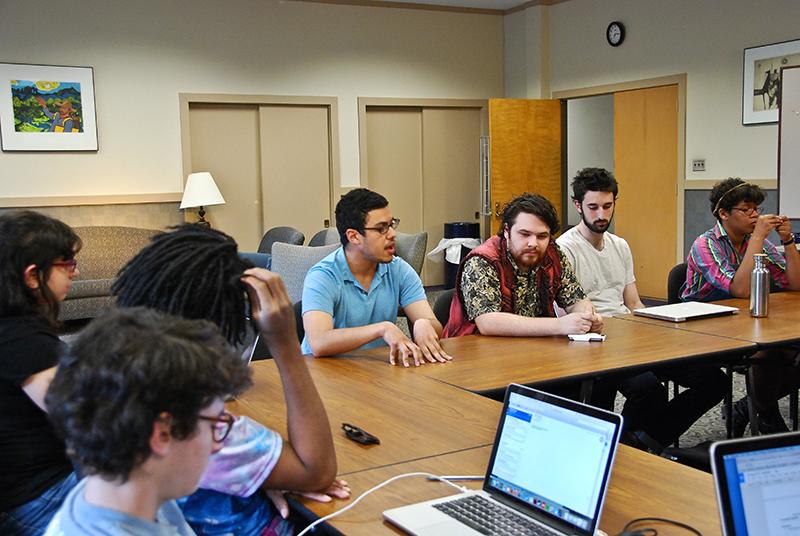Senate Endorses Financial Accessibility
College senior Zachery Crowell (center) and student senators discuss the tuition freeze. Senators passed a resolution supporting the protests but have disagreed about the most effective way to support financial accessibility.
May 8, 2015
Student Senate passed a resolution supporting the tuition protests and recent action around financial accessibility during plenary last Sunday. This resolution was passed a week after tuition activists brought a different resolution, which called for a tuition freeze, before Senate.
Senate discussed this original resolution but did not pass it, an action that inspired a letter to the editor last week condemning Senate’s inaction and questioning the organization’s relevance (“Silence on Tuition Hike Proves Senate’s Irrelevance,” The Oberlin Review, May 1, 2015).
College senior Dan Quigley, the main author and a signer of the letter, said the piece was a tool to push Senate into action.
“The letter was a means to an end — an idea based on public leveraging of Senate to not beat around the bush,” said Quigley. “That letter and the public indictment of Senate [was] for not being immediately, or very, very quickly being, behind the student body. That was more of a tool than a wholesale condemnation of the Senate.”
According to Senator and College junior Machmud Makhmudov, Senators supported the tuition protests but disagreed on the specifics.
“The disagreement was more so on tactics and specificity and not the general goal. I think everyone was very much in support of financial accessibility.”
Senator and College senior Molly Brand said Senate wanted to consider different ideas and approaches before releasing a resolution.
“The major qualms that I share and that people talked about is wanting Senate to be more than just a rubber stamp,” she said. “We’re an elected body and, in my opinion, we’re elected to have discussions and produce our own thoughts that incorporate and include student input. So it’s so significant that 1,000 students supported a petition that endorses that specific language specifically calling for a tuition freeze, but that doesn’t mean that Senate is required to get behind that exact proposal.”
Brand said the resolution the activists presented to Senate called for a tuition freeze, and she, along with other Senators, said she knew the administration was not going to support this action. She said she felt that the resolution Senate endorsed should instead try to use Senate’s capital with the administration to take an immediately productive stance.
The resolution Senate passed calls for increased transparency, the presentation of “a set of concrete proposals related to cost-cutting and financial accessibility” to students next semester and the creation of a financial accessibility working group that would include students, faculty and administrators.
Student Senator and College sophomore Jordan Ecker said he sees the different approaches of the proposed resolutions as an example of a common division among activist efforts on campus — the division between “coping,” or working with the administration to make incremental changes, and “fighting,” or working towards systemic change and refusing to cooperate with the administration.
“It really just depends on how long-term your view is,” Ecker said. “If you’re interested in mostly just your four years here, then coping is the way to go. If you’re interested in the larger scale future of higher ed, then Oberlin is a great place for some really radical students to organize and fight that fight. We can do that too.”
Senator and College first-year Anjali Kolachalam feels Senate’s connections and ability to work with administrators is one of the organization’s most important assets.
“Senate’s primary role … [is] to create things that make student life better, and they do that primarily through our connections with the administration,” Kolachalam said. “I think there are very few student organizations who have the relationship with administrators that we do.”
However, College senior Zachery Crowell, former Senator, signer of the letter and an organizer of the recent tuition protests, argues that, despite these connections, Senate is a dysfunctional organization.
“I stepped down [from Senate], and that was motivated by [the fact that] I thought Senate was too dysfunctional, and [if I had] any desire to actually address financial accessibility and to address these issues that affect the student body, my time would be spent better outside Senate.”
Brand pointed out that Senate has implemented several initiatives this semester, including the creation of a free meal program over spring break, the addition of six students to the Strategic Planning Steering Committee, presentations with Vice President of Finance Mike Frandsen about College finances and several changes to the Student Health Center resources.
Quigley, however, is also dissatisfied with Senate as an organization and feels it gives students a false sense of student representation and does not have the power to create large-scale change.
“Regardless of the individuals and their abilities, the Senate is just a bullshit structure,” Quigley said.
In the letter to the editor, Quigley suggested creating a students’ union in place of Senate. They said they aren’t sure how this would function, but it could possibly give students more bargaining power by organizing protests such as school-wide walkouts.
College junior Aaron Appel, who decided not to run for Senate again after his term ended at the beginning of last semester, said the need for a students’ union depends upon the College’s future trajectory.
“To me, a ‘students’ union’ could be that re-imagined institution taking the place of Senate,” Appel said in an email to the Review. “Of course, whether or not such a step is necessary depends in a large part on this vision for the future of Oberlin, which also plays into visions for the future of higher education — in other words, Oberlin needs to become a leader again.”


























